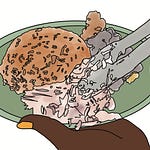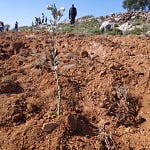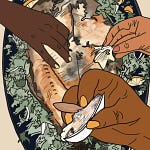Hi there, and thanks for subscribing to Feminist Food Journal.
This is one of the last pieces from our EARTH issue. If you’re just joining us, or just haven’t yet had the chance to read and listen to everything this issue has to offer, we encourage you to dig in. So far, in this issue, we’ve covered indigenous food sovereignty; reflected on the constitution of queer utopias in the digital age; considered the importance of energy justice to the conservation of agrobiodiversity and traditional foodways in Mexico; questioned the ways that Californian cuisine might shrink the plane of our politics at the expense of labouring bodies; and marvelled at the power of food and herbalism as tools of Black resistance, now and throughout history. We also have three back issues: MILK, WAR, and SEX.
For a limited time, we’re offering 20% off paid subscriptions. In addition to keeping our project going, becoming a paid subscriber means you get access to audio versions of our written pieces (very often read by the authors themselves) as well as other bonus content.
For now, we hope you’ll enjoy this podcast, where FFJ co-founding editor Zoë Johnson had the honour of speaking with Melanie Allen and amanda david about their work with the incredible Black Farmer Fund. They cover power in our food systems, the complexities of cultivating land in a capitalist settler-colonial context, and much more.
Listen now on Substack, your favourite podcast app, or the audio track below.
In the past century, 98 percent of Black agricultural landowners in the United States have been dispossessed of their holdings. They have lost altogether 12 million acres of agricultural land, with most of the losses occurring from the 1950s onwards. Between 1950 and 1975, more than half a million Black-owned farms across the country failed. According to an estimate by the Land Loss and Reparations Project, the dispossession of Black farmers in the American South alone has implied a loss of $250 to $350 billion in accumulated wealth and income for Black farmers and their communities.
This systematic disconnection of Black people from the land occurred through a variety of means, which in the words of Atlantic writer Vann R. Newkirk II, “were sometimes legal, often coercive, in many cases legal and coercive, and occasionally violent”. Those of you who have read or listened to Dr. Alice Ragland’s piece “More Radical Than It May Seem”, which was published as part of this EARTH issue, will already know how these outcomes are the result of a long history of colonialism, slavery, and racist policy making. As she writes:
“Even after the end of sharecropping, the history of dispossessing African American farmers continued. Black farmers were excluded from land purchases by federal programs and policies; their legal protections related to intergenerational property transfer were limited; and it remained harder for Black farmers to access the capital needed to maintain their businesses because of discriminatory lending practices. Combined with the fact that most farm subsidies have continued to go to white farmers, this means that access to agriculture within many Black communities in the US is limited.”
According to an analysis by NPR, even as recently as 2022, only 36 percent of Black farmers who applied for direct loans from the US Department of Agriculture were approved, compared to 72 percent of white farmers who applied. This, despite the fact that direct loans are supposed to be the easiest type of USDA loan to acquire; they are meant for farmers who can't get credit elsewhere and can be used to buy land, and farming equipment or cover other operational costs needed to keep a business alive.
Enter Black Farmer Fund.
Credits
This episode features writing and sound editing by Zoë Johson; research by Zoë Johnson & Isabela Vera; and original music by the Electric Muffin Research Kitchen.
Audio clips include Dr. Alice Ragland, from her recording of “More Radical Than It May Seem” from Feminist Food Journal; and Karen Washington, from the video “Community Wealth Building” by Black Farmer Fund.
Transcript
Full transcript of the podcast is available here.
Shownotes
Learn more about Black Farmer Fund on their website, where you can also watch the powerful “Black Farmers Thriving” video series. For more information on investing, you can email invest@blackfarmerfund.com.
Check out amanda david’s initiative, Rootwork Herbals and read about the Jane Minor BIPOC Community Medicine Garden.
Further Readings
“The Great Land Robbery” (Vann R. Newkirk II, The Atlantic)
“Help Black Farmers, Who Know Hyperlocal Doesn’t Mean Fancy” (Tressie McMillan Cottom, The New York Times)
“Race, Land, and the Law: Black Farmers and the Limits of a Politics of Recognition” (Brian Williams and Tyler McCreary, Black Food Matters: Racial Justice in the Wake of Food Justice)
“The USDA Is Set To Give Black Farmers Debt Relief. They've Heard That One Before” (Emma Hurt, NPR)












